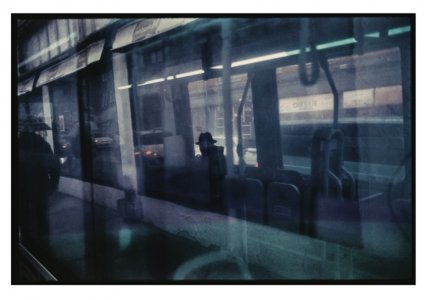You are using an out of date browser. It may not display this or other websites correctly.
You should upgrade or use an alternative browser.
You should upgrade or use an alternative browser.
Kafkaesque
- Thread starter Freakscene
- Start date
- Latest activity Latest activity:
- Replies 248
- Views 14K
raphaellehnen
Established
rhl-oregon
Cameras Guitars Wonders
rhl-oregon
Cameras Guitars Wonders
rhl-oregon
Cameras Guitars Wonders
Ororaro
Well-known
Retro-Grouch
Veteran
Joao
Negativistic forever
boojum
Ignoble Miscreant
The list is amazing. Photos are an especial form of Kafkaesque grotesquery. And Kafka's imagination was so broad and deep that we are hard pressed to sound it. In film I would propose and old favorite that pushes the border of the acceptable in documentarians, Man Bites Dog. Man Bites Dog (film) - Wikipedia The unexpurgated version will churn your guts. What sort of mad world do we live in and how can we be drawn in by charming monsters? Perhaps this fellow, the protagonist (?) fits the Hannah Arendt declaration of the banality of evil. It does skirt the frightening grotesquery of Kafka. But who can match it? I think that Kafka will remain unequaled.
boojum
Ignoble Miscreant
Of course, mental images depend on vocabulary, words depend on language. Native speakers of different languages think differently - this has always been the case and will be the case.and this is wonderful.
I have a feeble, fading grasp of German and French. I am grateful for the shreds I have left. For when I can speak some in the language I can think some in the language and that, in effect, is like putting on a new pair of glasses. My Spanish is now a joke, but the things I remember are wonderful. And Spanish is a minefield. Esta beueno means "it's good". Esta buena means "I want to jump on your bones, mamma". Different national Spanishes have different meanings for the same word and it gets tricky.
I worked with many Asians in the SF Bay Area for about 20 years and picked up some of their slang. Chicken talk - duck talk: look similar but cannot communicate. There are more. But back to the thread, to have read Kafka and his diaries and so on in the original is to comprehend at the gut level. All that head stuff is great but to be able to feel what the writer felt, that is another thing. As an example, I dated a lovely woman who was Russian by descent. Her mother read Zhivago in Russian when it came out. She later read it again in English and thought ti was a different book.
dab
Electromagnetic waves sensor
boojum
Ignoble Miscreant
Kafkaesque [kafkə(r)ˈɛsk] adjective
1. characteristic or reminiscent of the oppressive or nightmarish qualities of Franz Kafka's fictional world.
2. Like the world Kafka invented; recognisable but unreal, precisely detailed and dreamlike
Post your Kafkaesque photos here.
View attachment 4847819
View attachment 4847820
“Fotografieren? Das ist wirklich ziemlich unheimlich*. Und Sie vergrößern sie auch!” / “Taking photographs? That’s really rather unsettling. And you enlarge them too!”
Kafka to Friedrich Thieberger
*Edit: this is one reason that Kafka is very difficult to translate. In this context for unheimlich, 'creepy' is too simple, 'uncanny' is probably closest but it sounds wrong, unsettling is ok but lacks the emphasis of strangeness. It is unheimlich, but what exactly that works out to in English is hard. And saying 'strangely unsettling' is closest, but then you've made one word into two and wrecked the cadence of the sentence. Kafka is Kafka.
You have really stirred the pot with this one. And tonight is Halloween to boot.
Brambling
Well-known
yes, yes, yes, the map of the worldview is determined by the language and images that sit in this language))).I have a feeble, fading grasp of German and French. I am grateful for the shreds I have left. For when I can speak some in the language I can think some in the language and that, in effect, is like putting on a new pair of glasses. My Spanish is now a joke, but the things I remember are wonderful. And Spanish is a minefield. Esta beueno means "it's good". Esta buena means "I want to jump on your bones, mamma". Different national Spanishes have different meanings for the same word and it gets tricky.
I worked with many Asians in the SF Bay Area for about 20 years and picked up some of their slang. Chicken talk - duck talk: look similar but cannot communicate. There are more. But back to the thread, to have read Kafka and his diaries and so on in the original is to comprehend at the gut level. All that head stuff is great but to be able to feel what the writer felt, that is another thing. As an example, I dated a lovely woman who was Russian by descent. Her mother read Zhivago in Russian when it came out. She later read it again in English and thought ti was a different book.
There are many literary works on this topic - Stranger in a Strange Land Robert A. Heinlein, for example. I really love this book)
boojum
Ignoble Miscreant
yes, yes, yes, the map of the worldview is determined by the language and images that sit in this language))).
There are many literary works on this topic - Stranger in a Strange Land Robert A. Heinlein, for example. I really love this book)
And Bradbury and Asimov. Sci-Fi is a deep well. And then cinema Sci-Fi. Blade Runner is my classic fave. And the female lead, Sean Young, a classic tragedy. From the heights to the depths, but brilliant while at the height.
Yes, the pot has been stirred in this thread. Woohoo! It is like a school recess where we are freed from the disciplines and allowed to run free.
agentlossing
Well-known
dab
Electromagnetic waves sensor
That's an interesting book! With clear observations on our society, language and communications.yes, yes, yes, the map of the worldview is determined by the language and images that sit in this language))).
There are many literary works on this topic - Stranger in a Strange Land Robert A. Heinlein, for example. I really love this book)
CP93
Established
Great thread!
maddoc
... likes film again.
unheimlich = eerie fits quite well.Kafkaesque [kafkə(r)ˈɛsk] adjective
1. characteristic or reminiscent of the oppressive or nightmarish qualities of Franz Kafka's fictional world.
2. Like the world Kafka invented; recognisable but unreal, precisely detailed and dreamlike
Post your Kafkaesque photos here.
View attachment 4847819
View attachment 4847820
“Fotografieren? Das ist wirklich ziemlich unheimlich*. Und Sie vergrößern sie auch!” / “Taking photographs? That’s really rather unsettling. And you enlarge them too!”
Kafka to Friedrich Thieberger
*Edit: this is one reason that Kafka is very difficult to translate. In this context for unheimlich, 'creepy' is too simple, 'uncanny' is probably closest but it sounds wrong, unsettling is ok but lacks the emphasis of strangeness. It is unheimlich, but what exactly that works out to in English is hard. And saying 'strangely unsettling' is closest, but then you've made one word into two and wrecked the cadence of the sentence. Kafka is Kafka.















